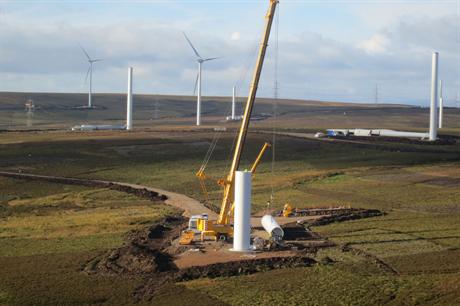Question: What would Scottish independence mean to the wind industry?
Maf Smith, deputy chief executive, RenewableUK
 In less than a week, we'll know the result. Whatever it is, nothing will be the same again. If the vote for independence is yes, a process of negotiation starts. The Scottish Government want this all wrapped up within eighteen months, but in reality it could take longer.
In less than a week, we'll know the result. Whatever it is, nothing will be the same again. If the vote for independence is yes, a process of negotiation starts. The Scottish Government want this all wrapped up within eighteen months, but in reality it could take longer.
If it's no, we're still likely to see further devolution and a shift towards a more federal style of working. And don't be surprised if a future Scottish Government asks for devolved energy powers, as energy has been a key part of the campaign on both sides.
The Scottish Government uses renewables to underpin its case for independence and wants a shared system. The UK government warns of a funding gap for Scotland if it leaves. The UK does rely on Scotland to deliver renewable capacity. But equally, Scotland depends on a UK policy framework that funds development and assures investors. Most people in the industry foresee that if independence comes, there would be a shared network. But a shared market does not translate into continued pooled support to underpin the growth of renewable energy, so it would also be naive to expect the CfD market to survive unchanged.
These are complex issues and lots of "what ifs". But a big frustration is that debate has been on whether independence helps or hinders delivery of our 2020 targets. In the context of forging an independent nation that's but a small step, yet neither side has anything practical to say on what these two paths would mean for renewables more than six years from now.
Dr David Toke, University of Aberdeen, co-author of Delivering Renewable Energy Under Devolution (Dreud) report
 After a 'Yes' vote for independence there would be a common drive by the British renewables industry and the electricity industry to ensure the integrity of the British electricity system. This would include getting an assurance from the Westminster Government that they would 'grandfather' Renewable Obligation Certificates from existing (and soon-to-be installed) Scottish renewable schemes, including many windfarms.
After a 'Yes' vote for independence there would be a common drive by the British renewables industry and the electricity industry to ensure the integrity of the British electricity system. This would include getting an assurance from the Westminster Government that they would 'grandfather' Renewable Obligation Certificates from existing (and soon-to-be installed) Scottish renewable schemes, including many windfarms.
Otherwise the UK electricity majors would face big financial losses which would impair their ability to attend to the urgent task of fulfilling the UK Government's proposals to develop new generating capacity. It would be self-defeating for the UK Government to resist this and to try and break up the system.
However the Scottish Government would have to fund new windfarms out of Scottish resources, at least after 2020 when remit of the EU Renewables Directive ends. Yet the Scottish Government has already achieved more than half of their target of 100 per cent of electricity from renewable energy and the rest could be achieved cheaply through installing existing plans for more onshore windfarms.
The Scots would have to pay for this, but this would be offset by not having to pay for the nuclear power stations that the UK intends to build.
Kirsty Macpherson, head of energy and natural resources, Gillespie Macandrew
 The First Minister has continually championed the wind industry and this should continue to be the case. I would, therefore, hope that there could be a seamless transition going forward, but the wind industry will require clarification of the Scottish Government's position in a number of key areas.
The First Minister has continually championed the wind industry and this should continue to be the case. I would, therefore, hope that there could be a seamless transition going forward, but the wind industry will require clarification of the Scottish Government's position in a number of key areas.
The market, ultimately, does not like uncertainty so the more decisive (and quicker) the First Minister can be, the better for all concerned. The Scottish Government needs to effect clear guidance on the incentives schemes and how these would work both at FIT level and ROCS/CfDs.
Grid issues, too, have to be considered. The no campaign has argued this is an issue for an independent Scotland, however, this is more likely to cause the remainder of the UK an issue. Scotland exports over 25% of its electricity (including "green" electricity) each year to England and Wales. So if this export was no longer permitted where would the deficit of power come from?
England and Wales can purchase from mainland Europe but it is not clear if this can replace the amount received from Scotland and some pundits suggest this is not possible.
We only need to look at the oil market and the success of Aberdeen that, with the correct tax regime and incentive package, there is a real potential for Scotland going forward.
In summary, clear, decisive and quick decision making by the First Minister and Scottish Government could ensure that an independent Scotland has a thriving industry. Uncertainty will lead to investment stalling and could be the nail in the coffin for many projects.
Spokesperson, Scottish Renewables, trade body
The outcome of the referendum is a decision for the people of Scotland. Scottish Renewables' role is to create the best possible environment for the future growth of the industry, whichever way the vote goes.

.png)


.png)










